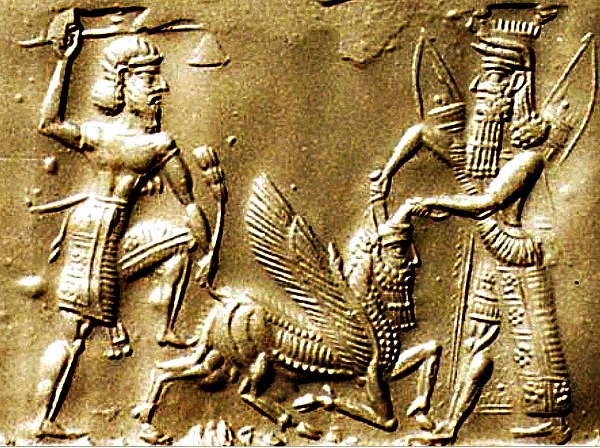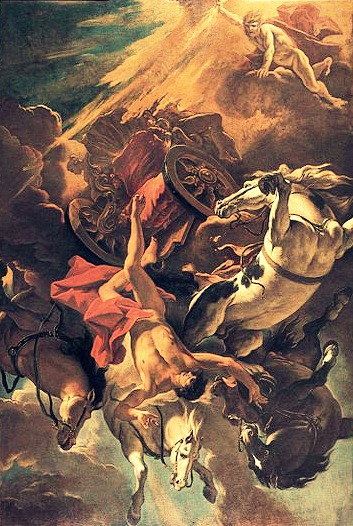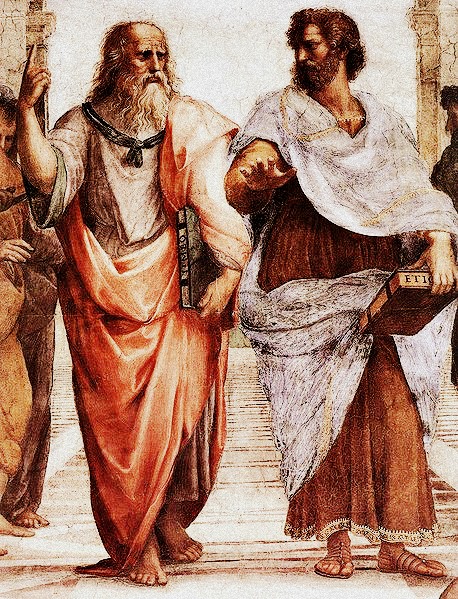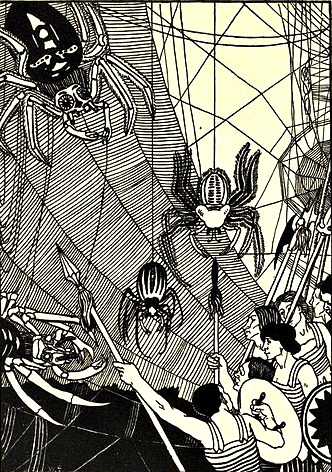The Need for Mythology
September 27, 2013
Gilgamesh and Enkidu from the mythology of Samaria battle Humbaba, whose mouth is fire and
whose breath is death (Source – Bensozia)
All societies have a mythology of some sort but they are probably more important to pre-literate cultures than to literate ones. Once a society acquires the ability to record things via the written word, many disciplines arise such as history, philosophy, science and psychology that all attempt to explain the functions of the world, give values and to describe human experience.
Before these disciplines grow, traditional tales handed down orally from one generation to another have to serve to pass on all its teachings. Doing this in the form of stories is useful as it makes the lessons being taught easier to remember and prompts people to spend time thinking about the messages, laws or values being expressed.
They often serve to instruct the audience on how to behave by warning of dire consequences that could happen to them if they do not follow the accepted norms of the day. To that end, mythical stories can be split into two types;
- Myths that are meant to explain something are referred to as Etiological myths and often explain how things became the way they are and why things exist.
- Myths that are told to provide a justification for an aspect of society such as religious ceremonies, marriage rules etc. are often called Charter myths.
Mythology and Nature
It is often the case that a society’s first myths are personifications or embodiments of natural objects or forces. Examples of these ‘Nature Myths’ include Gaia, who was seen by early Greeks as being both literally the earth and a humanoid personification of it or Zeus, who probably came later and while he is not the personification of lightning, wields control over it.
The Fall of Phaeton by Sebastiano Ricci (1703/4) depicting Zeus
throwing a thunderbolt (Source - Wikimedia)
These stories, it can be argued, are a way of discussing human relationships with the natural world. They would have helped to explain or at least give a little comprehension on forces that would have often been unfathomable and overwhelming to early and pre-civilized societies.
Mythological Stories and Religion
According to the 19th century storytellers the Grimm brothers, "Divinities form the core of all mythology." As myths so often involve gods, it also overlaps as a subject with ancient religion which is a problematic aspect of trying to determine the definition of myth. The two can be separated however by saying religion is what people actually did, e.g. the rituals and the services they performed while myths are the narratives that go along with them. This is not a universally accepted division but does serve a useful purpose for the study of mythology.As a result of this connection with religion, mythological stories tended to be believed by many people during the period in which they were formed. That said there would have often been several versions of a particular tale that could vary widely, especially before it got recorded to the written word. Poets and priests used them extensively to teach what they held to be metaphysical facts such as how the world was created and what was or was not considered correct behaviour.
Philosophy and Myth
Despite the religious connotations, in the ancient world there was often a divide between thinkers. Some believed that the myths were divinely inspired truths but others had a more rational, sceptical take on it. Many early theorists looked for observable evidence and arguments based on reason and logic to discover the secrets of existence and the world in which they lived.
Plato (left) and Aristotle (right) discussing the nature of knowledge
(Source – Wikipedia)
However philosophers did sometimes use stories to illustrate certain points that had been arrived at through logical thinking. These 'Rational Myths' were invented by the Greek philosopher Plato and were used extensively after his time though they were never intended to be believed as fact, just to be a way of making a point through parables and other story telling devices. Even though we know myths to be untrue, that does not stop us being fascinated by them. We still teach these stories to children both those from our own culture and others suggesting that we still recognise some educational value in them.
Mythology in Modern Society
The reason human society has needed myth over the years is the same reason we need science today; it is a means to try to explain life, the universe and everything. The stories attempt to tell us where we came from, who and what we are, how we should behave and they attempt to give us some concept of the divine.Some experts see ancient myths as the forerunner to modern literature and elements of them can be seen in novels, poetry and more recently in movies and TV programs. Award winning lecturer Elizabeth Vandiver, who teaches Classics at the University of Maryland is even more specific and suggests that the equivalent stories we have to mythology in modern society are stories of aliens, future civilisations and humans from the future.
There have been many 'dark ages' in between periods of high civilisation throughout history and people who lived during these times would have viewed the left over buildings, statues and artefacts with awe. Without the knowledge or technology needed to make great structures themselves, they would have wondered how such things were possible so assumed those who built them to have super-human abilities and divine help. Unchartered territories would also be a common talking point and arouse a natural fear of the unknown. This would have given rise to the stories of monsters and half-human creatures that most mythologies have in abundance.

An Illustration from an early Sci-Fi story, True History (1894) depicting
a battle between humans and people from the moon, with giant spiders
being used as weapons (Source - Wikipedia)
Vandiver states that the study of history and other disciplines has led us to know unequivocally that there were no technologically advanced societies in the past in comparison to our own. As a result, we can no longer put super humans and humans with god-like abilities into a distant past or for that matter place monsters into distant, uncharted parts of the earth.
As a result we instead use science fiction as a vehicle to put them into the near or distant future and/or into outer space. Whereas mythmakers from the past often talk about heroes and gods being their ancestors, in sci-fi the implication is that they are our descendants. This preserves the idea of a connection and often a blood relation with people and other beings that are, one way or another, superior to us.
References
Delahoyde, M. & Hughes, C. [Internet]. 2013. What is Myth? Washington State University. Available from: http://public.wsu.edu/~gened/orpheus/myth.html [Accessed September 26, 2013].Joseph, M. [Internet]. 2001. In Search of Cupid and Psyche: Myth and Legend in Children's Literature. Rutgers. Available from: http://comminfo.rutgers.edu/~mjoseph/argument.html [Accessed September 26, 2013].
Leeming, D.A. 1990. The World of Myth. New York: Oxford University Press,
Leonard, S.A. [Internet]. 2013. What is Myth? Youngstown State University. Available from: http://www.as.ysu.edu/~saleonard/What%20is%20Myth.html [Accessed September 26, 2013].
Vandiver, E. [Video Lecture]. 2002. TTC - Classical Mythology. Whitman College
Posted by Andrew Griffiths. Posted In : General
.jpg)

